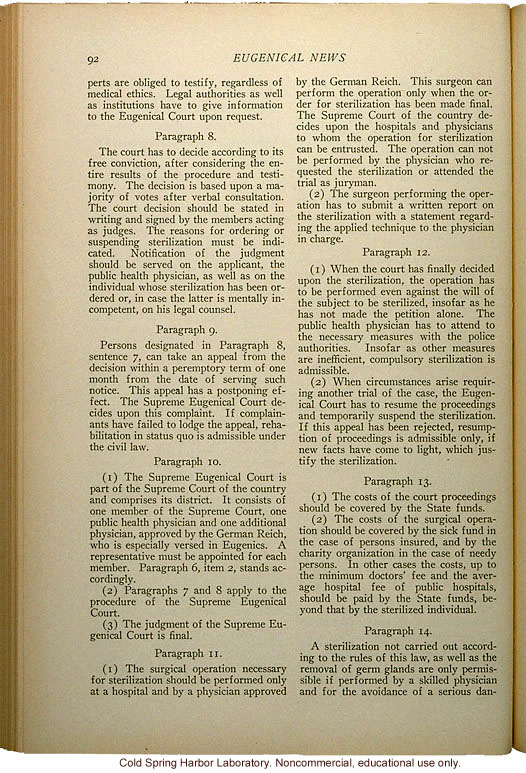"Eugenical Sterilization in Germany," Eugenical News (vol. 18:5), commentary and full translation of the German sterilization statute of 1933 (3)

"Eugenical Sterilization in Germany," Eugenical News (vol. 18:5), commentary and full translation of the German sterilization statute of 1933 (3)
1904. 92 Eugenical News perts are obliged to testify, regardless of medical ethics. Legal authorities as well as institutions have to give information to the Eugenical Court upon request. Paragraph 8. The court has to decide according to its free conviction, after considering the entire results of the procedure and testimony. The decision is based upon a majority of votes after verbal consultation. The court decision should be stated in writing and signed by the members acting as judges. The reasons for ordering or suspending sterilization must be indicated. Notification of the judgment should be served on the applicant, the public health physician, as well as on the individual whose sterilization has been ordered or, in case the latter is mentally incompetent, on his legal counsel. Paragraph 9. Persons designated in Paragraph 8, sentence 7, can take an appeal from the decision within a peremptory terms of one month from the date of serving such notice. This appeal has a postponing effect. The Supreme Eugenical Court decides upon this complaint. If complainants have failed to lodge the appeal, rehabilitation in status quo is admissible under the civil law. Paragraph 10. (I) Supreme Eugenical Court is part of the Supreme Court of the country and comprises its district. It consists of one member of the Supreme Court, one public health physician and one additional physician, approved by the German Reich, who is especially versed in Eugenics. A representative must be appointed for each member. Paragraph 6, item 2, stands accordingly. (2) Paragraphs 7 and 8 apply to the procedure of the Supreme Eugenical Court. (3) The judgment of the Supreme Eugenical Court is final. Paragraph 11. (I) The surgical operation necessary for sterilization should be performed only at a hospital and by a physician approved by the German Reich. This surgeon can perform the operation only when the order for sterilization has been made final. The Supreme Court of the country decides upon the hospitals and physicians to whom the operation for sterilization can be entrusted. The operation can not be performed by the physician who requested the sterilization or attended the trial as juryman. (2) The surgeon performing the operation has to submit a written report on the sterilization with a statement regarding the applied technique to the physician in charge. Paragraph 12. (I) When the court has finally decided upon the sterilization, the operation has to performed even against the will of the subject to be sterilized, insofar as he has not made the petition alone. The public health physician has to attend to the necessary measures with the police authorities. Insofar as other measures are inefficient, compulsory sterilization is admissible. (2) When circumstances arise requiring another trial of the case, the Eugenical Court has to resume the proceedings and temporarily suspend the sterilization. If this appeal has been rejected, resumption of proceedings is admissible only, if new facts have come to light, which justify the sterilization. Paragraph 13. (I) The costs of the court proceedings should be covered by the State funds. (2) The costs of the surgical operation should be covered by the sick fund in the case of persons insured, and by the charity organization in the case of needy persons. In other cases the costs, up to the minimum doctors' fee and the average hospital fee of public hospitals, should be paid by the State funds, beyond that by the sterilized individual. Paragraph 14. A sterilization not carried out according to the rules of law, as well as the removal of germ glands are only permissible if performed by a skilled physician and for the avoidance of a serious dan- [end]
- ID: 11819
- Source: DNALC.EA


